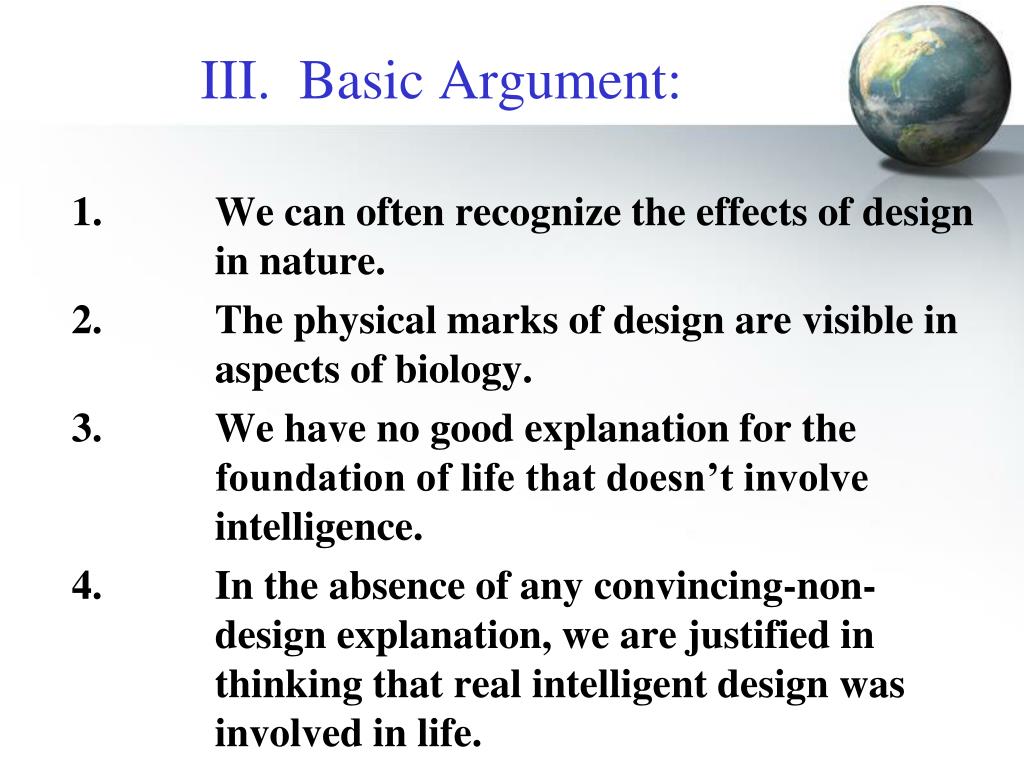Table Of Content
He authored a book "Gematria Refigured," which presents a rational, nonmystical approach to gematria as a tool of uncovering the significance of quantity and fine-tuning in Torah, life, and the universe. Multiverse scientists can get out of this problem if they can establish the third premise - that our universe is a typical, or a likely universe with intelligent observers. If so, scientists would only be able to explain our universe as a result of random chance but wouldn’t be able to equally explain all other possible universes with intelligent observers (like those with heavenly voices falsifying the multiverse).
The Scientifically Legitimate Uses of Design Inferences
But although gaps would profoundly strengthendesign arguments, they have their suite of difficulties. Gaps areusually easy to spot in cases of artifactuality (take the radioexample, again), but although they may be present in nature,establishing their existence there can usually be done (byscience, at least) only indirectly—via probabilityconsiderations, purported limitations on nature’s abilities,etc. Schema 2, not being analogically structured, would not be vulnerableto the ills of analogy,[3] and not being inductive would claim more than mere probability forits conclusion. Indeed, it has been arguedthat Paley was aware of Hume’s earlier attacks on analogicaldesign arguments, and deliberately structured his argument to avoidthe relevant pitfalls (Gillispie 1990, 214–229). In response, one might be tempted to argue that there is one context in which scientists employ the design inference without already having sufficient reason to think the right sort of intelligent agency exists. As is well-known, researchers monitor radio transmissions for patterns that would support a design inference that such transmissions are sent by intelligent beings.
The Design Argument — six critical questions
[S]uppose I found a watch upon the ground, and it should be inquired how the watch happened to be in that place, I should hardly think...that, for anything I knew, the watch might have always been there. Yet why should not this answer serve for the watch as well as for [a] stone [that happened to be lying on the ground]? The Universe troubles me, and much less can I thinkThat this clock exists and should have no clockmaker. [S]uppose I found a watch upon the ground, and it should be inquired how the watch happened to be in that place, I should hardly think … that, for anything I knew, the watch might have always been there.
3 Inferences to the Best Explanation/Abductive Design Arguments: Schema 3

Science need not be seen as exhausting the space of legitimateconclusions from empirical data. In any case, the floods of vitriolflowing from bothsides in the current ID discussion suggest that much more than thepropriety of selected inferences from particular empirical evidencesis at issue. It is not uncommon for humans to find themselves with the intuitionthat random, unplanned, unexplained accident justcouldn’t produce the order, beauty, elegance, andseeming purpose that we experience in the natural world around us. AsHume’s interlocutor Cleanthes put it, we seem to see “theimage of mind reflected on us from innumerable objects” innature (Hume 1779 [1998], 35). And many people find themselvesconvinced that no explanation for that mind-resonance whichfails to acknowledge a causal role for intelligence, intent andpurpose in nature can be seriously plausible. Also starting already in classical Greece, two approaches to the teleological argument developed, distinguished by their understanding of whether the natural order was literally created or not.

There is nothing that has been said here that necessitates that the designer is intelligent, purposeful, or even meaningful in the designs that we observe. If this were true, then the Teleological Argument would also be proved and we would quite easily know the purposes of existence. However, showing that there is a concerted intelligence in the apparent design is another step. Regardless, if there is no explanation using scientific understandings and laws that fully explain how we have come to exist as we are, then the BDA has done its work.
Creation science and intelligent design
Are ethics an expression of the divine, or are ethics better understood separate from divine authority? To explore this topic further, students will find a helpful overview and updated references in the Stanford Encyclopedia article, "Moral Arguments for the Existence of God." A number of prominent figures historically in fact held that we coulddetermine more or less perceptually that various things in nature werecandidates for design attributions—that they were in therequisite respects design-like. Some, like William Whewell,held that we could perceptually identify some things as more than merecandidates for design (1834, 344). Thomas Reid also held a view inthis region,[13] as did Hume’s Cleanthes, and, more recently, Alvin Plantinga(2011, 263–264). Tilting the conceptual landscape via prior commitments is both anequal opportunity epistemic necessity and a potential pitfallhere.
Arguing God With Christopher Hitchens - The Imaginative Conservative
Arguing God With Christopher Hitchens.
Posted: Sat, 09 May 2020 07:00:00 GMT [source]
Watches and Watchmakers
Some philosophers reframe the problem of evil as the problem of suffering to place the stress of the question on the reality of suffering versus moral agency. Alternatively, it could be argued that although there is a genuineconceptual link between appropriate Rs and mind, design,intent, etc., that typically our recognition of that link istriggered by specific experiences with artifacts. On this view, oncethe truth of (6) became manifest to us through those experiences, theappropriateness of its more general application would be clear. Thatmight explain why so many advocates of design arguments seem tobelieve that they must only display a few cases and raisetheir eyebrows to gain assent to design.
b. The Argument from Simple Analogy
Schlesinger argues that the fact that the universe is fine-tuned for life is improbable in exactly the same way that John’s winning three consecutive lotteries is improbable. After all, it is not just that we got lucky with respect to one property-lottery game; we got lucky with respect to two dozen property-lottery games—lotteries that we had to win in order for there to be life in the universe. Given that we are justified in inferring intelligent design in the case of John’s winning three consecutive lotteries, we are even more justified in inferring intelligent design in the case of our winning two dozen much more improbable property lotteries. Thus, Schlesinger concludes, the most probable explanation for the remarkable fact that the universe has exactly the right properties to sustain life is that an intelligent Deity intentionally created the universe such as to sustain life. The problem, however, is that it is the very existence of an intelligent Deity that is at issue. To justify preferring one explanation as more probable than another, we must have information about the probability of each explanation.
Modern-day biologist, Richard Dawkins, following in the footsteps of Darwin, likened evolution to a blind watchmaker that creates new life forms without any need for intelligence. A classic response to the observation that the conditions in ouruniverse seem fine-tuned for life is to infer the existence of acosmic designer who created life-friendly conditions. If oneidentifies this designer with some supernatural agent or God, theinference from fine-tuning for life to the existence of a designerbecomes a version of the teleological argument. Indeed, many regardthe argument from fine-tuning for a designer as the strongest versionof the teleological argument that contemporary science affords. Many researchers believe that the fine-tuning of the universe’slaws, constants, and boundary conditions for life calls for inferringthe existence of a divine designer (see Section 3) or a multiverse—a vast collection of universes with differinglaws, constants, and boundary conditions (see Section 4). The inference to a divine designer or a multiverse typically rests onthe idea that, in view of the required fine-tuning, life-friendlyconditions are in some sense highly improbable if there isonly one, un-designed, universe.
They form the grand relation of animated nature; universal, organic, mechanical; subsisting like the clearest relations of art, in different individuals; unequivocal, inexplicable without design. Perhaps you are the one who is confused when you assert that physical constants are completely undetermined. Perhaps we lack the understanding that physical constants just ARE in the same way that mathematical constants just ARE. Aaron Zimmer, cohost of the Physics to God podcast, earned a physics degree and received rabbinical ordination from Rabbi Yisrael Chait. Aaron then utilized his personal resources to venture into commodity futures trading, such as oil, natural gas, cotton, sugar, and coffee.
Swinburne acknowledges that his argument by itself may not give a reason to believe in the existence of God, but in combination with other arguments such as cosmological arguments and evidence from mystical experience, he thinks it can. We see that things which lack knowledge, such as natural bodies, act for an end, and this is evident from their acting always, or nearly always, in the same way, so as to obtain the best result. Hence it is plain that they achieve their end, not fortuitously, but designedly. Now whatever lacks knowledge cannot move towards an end, unless it be directed by some being endowed with knowledge and intelligence; as the arrow is directed by the archer. Therefore, some intelligent being exists by whom all natural things are directed to their end; and this being we call God.
Furtherinvestigation of (6) requires taking a closer look at the Rswhich (6) involves. The watch does play an obvious and crucial role—but as aparadigmatic instance of design inferences rather than as theanalogical foundation for an inferential comparison. The ability to appreciate aesthetics has no evolutionary value, such that the only explanation as to why we can appreciate creation must be that God gave us the ability as a gift.

No comments:
Post a Comment